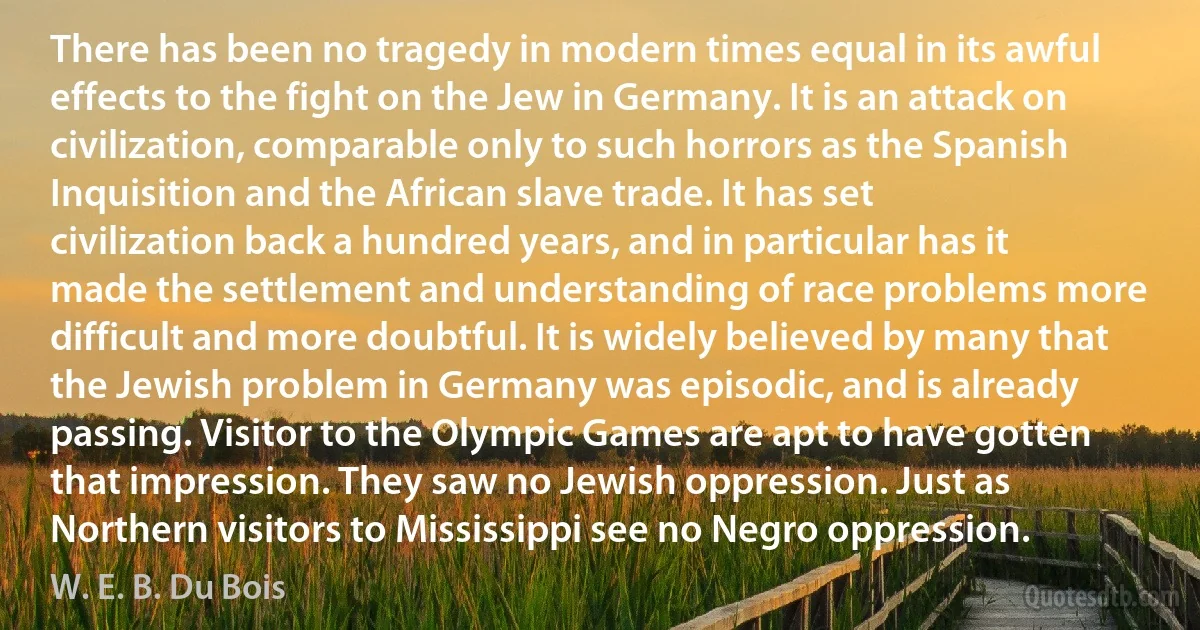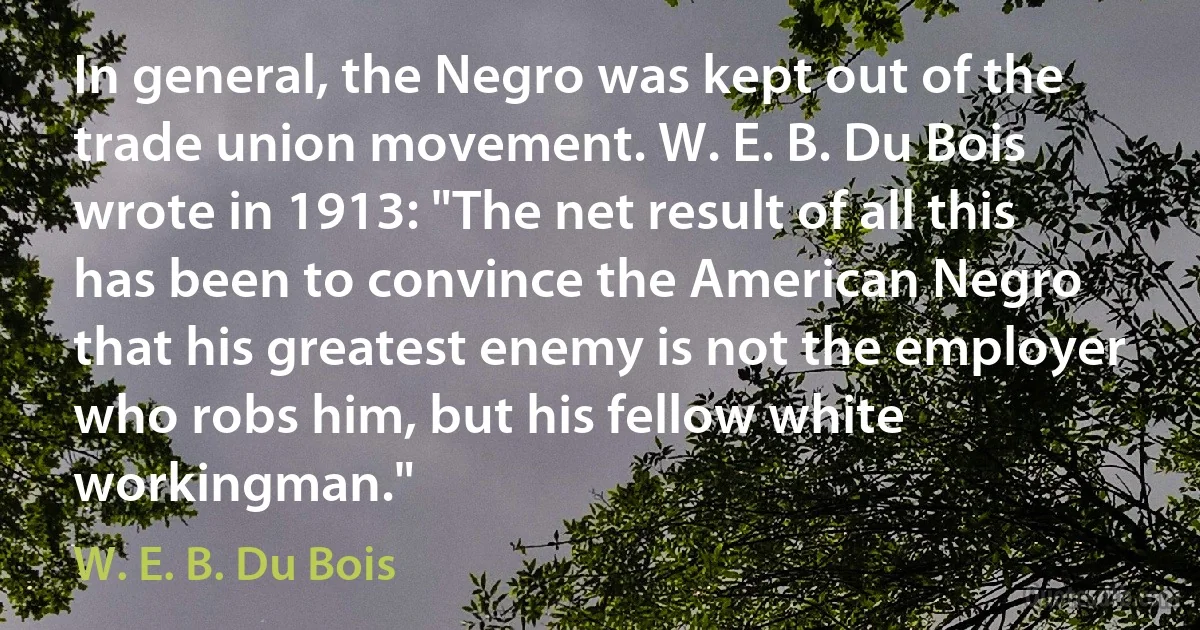W. E. B. Du Bois quotes - page 4
All men cannot go to college but some men must; every isolated group or nation must have its yeast, must have for the talented few centers of training where men are not so mystified and befuddled by the hard and necessary toil of earning a living, as to have no aims higher than their bellies, and no God greater than Gold.

W. E. B. Du Bois
President Johnson, forgetting his own pre-war declaration that the "great plantations must be seized, and divided into small farms,” declared that this land must be restored to its original owners and this would be done if owners received a presidential pardon. The pardoning power was pushed and the land all over the South rapidly restored. Negroes were dispossessed.

W. E. B. Du Bois
He was at once a scientist in his skillful use of history as a tool for comprehending the present, and a prophet in the application of his gift for analyzing the present as an indicator of the future. Because he lived simultaneously firmly entrenched within his time and decades ahead of it, the light of his wisdom, like that of his great love for humanity, is one that never diminishes.

W. E. B. Du Bois
Black Reconstruction is not the sort of book any scholar would want as the foundation of a new interpretive school. Du Bois was no historian. He consulted only limited sources and did no original archival research, an omission that "disturbed many scholars, several of whom dyspeptically noted the author's generous foundation support,” according to his biographer David Levering Lewis. The germ of the project was a dispute Du Bois had with the editors of Encyclopedia Britannica in 1929. They commissioned an entry on black history from him, which he withdrew when they asked him to delete some excessively rosy passages on Reconstruction. Obviously the Britannica editors wanted a racially progressive spin on history, or they would not have gone to Du Bois. But there is a line between creative reinterpretation and outright fantasy, and in their professional opinion, Du Bois had crossed it.

W. E. B. Du Bois
every person in this country, from high school to the postgraduate level, should read W. E. B. Du Bois's Black Reconstruction in America. In the 1960s we confronted issues that should have been resolved in the 1860s. And I'm making this point because what happens when 2060 rolls around? Will people still be addressing these same issues?

W. E. B. Du Bois
W.E.B. Du Bois called such erasure [of the first arrival of enslaved Africans to America] the propaganda of history. "It is propaganda like this that has led men in the past to insist that history is 'lies agreed upon'; and to point out the danger in such misinformation," he wrote in his influential treatise Black Reconstruction (1935). Du Bois argued that America had falsified the fact of its history "because the nation was ashamed.”.

W. E. B. Du Bois
"For a brief period for the seven mystic years that stretched between Johnson's 'Swing Around the Circle' to the Panic of 1873-the majority of thinking Americans of the North believed in the equal manhood of Negroes," W.E.B. Du Bois wrote in 1935. "While after long years the American world recovered in most matters, it has never yet quite understood why it could ever have thought that black men were altogether human." These Americans believed black lives mattered. But only for a moment.

W. E. B. Du Bois
In 1931, W. E. B. Du Bois attacked the decision to erect Confederate monuments as ahistorical and irresponsible: "The most terrible thing about War, I am convinced, is its monuments-the awful things we are compelled to build in order to remember the victims. In the South, particularly, human ingenuity has been put to it to explain on its war monuments, the Confederacy. Of course, the plain truth of the matter would be an inscription something like this: "Sacred to the memory of those who fought to Perpetuate Human Slavery." But that reads with increasing difficulty as time goes on. It does, however, seem to be overdoing the matter to read on a North Carolina Confederate monument: "Died Fighting for Liberty!"

W. E. B. Du Bois
The Enlightenment worldview held by Du Bois is ultimately inadequate, and, in many ways, antiquated, for our time. The tragic plight and absurd predicament of Africans here and abroad requires a more profound interpretation of the human condition - one that goes beyond the false dichotomies of expert knowledge vs. mass ignorance, individual autonomy vs. dogmatic authority, and self-mastery vs. intolerant tradition.

W. E. B. Du Bois



